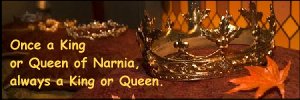I'm sure most of you have heard that Aslan is Turkish for lion. But it occurred to me just recently that Cor is Latin for heart, which is something that Shasta displays a lot of during HHB.
Do you suppose that it's a coincidence, or deliberate? Do any of the other characters names strike you as appropriate or having meaning?
We have hands that fashion and heads that know,
But our hearts we lost - how long ago! -- G. K. Chesterton
I think Lewis often deliberately chose names with certain meanings for the characters because of self-journeys they went on through the series. Lucy, for example, comes from Latin and means "light". Lucy is one of Aslan's closest followers. She follows the light of Narnia almost from the moment she steps in and sees the lantern.
The most obvious cases are those where the name is in English, as for several of the animals. Such names would indicate typical activities or characteristics of that species, like Trufflehunter for a Badger, or Farsight for an Eagle.
I don't know whether the name Pattertwig was characteristical for all squirrels or only for that particular squirrel, though - but when you see a squirrel running up and down a tree, it gives the impression of rushing around without pause and being very busy.

(avi artwork by Henning Janssen)
I think Lewis was an author who knew how to choose (or create) names for his characters that were very fitting. This is something I notice in a lot of excellent British authors like Dickens and Rowling.
I think the first name that I discovered was fitting in this way was Caspian, which is the name of a sea. It fits a seafaring king very well, does it not?
I hadn't made the connection between Cor and heart before, Mel. That's great! It makes me love his story even more.
A few more fitting names for you to think on: Corin means "spear" and is a name associated with Mars, the god of war. This fits his war-like nature. Cornelius means "horn." Well, then no wonder he has Susan's horn.  I like the name Cornelius also because in the Psalms the horn is used as a sign of strength, and Doctor Cornelius was certainly strong. If anyone else wants to look up names, I recommend using BehindtheName.com, as they are usually very accurate with their definitions and etymologies.
I like the name Cornelius also because in the Psalms the horn is used as a sign of strength, and Doctor Cornelius was certainly strong. If anyone else wants to look up names, I recommend using BehindtheName.com, as they are usually very accurate with their definitions and etymologies. 
"All the world will be your enemy, Prince with a Thousand Enemies. And when they catch you, they will kill you. But first they must catch you..."
Inexhaustible Inspiration
6689 posts from forum 1.0
Excellent idea. If Aslan is a Turkish name for lion, then Tash is also a Turkish name, this time for stone or rock. Unlike in Last Battle, where Tash does make an appearance, Tash is noticeably unresponsive in HHB whatever Rabadash said.
Corin does mean spear, but it comes from the Latin name Quirinus, which was a link to state power, even Royalty. It was on the Quirine Hill where the chief state offices were in Rome. Janus Quirinus was the two faced god of power in Roman affairs which became less potent later on.
Rabadash is another Turkish name, meaning God-namesake, which sounds a bit offensive. However, Rabadash did seem to think that Tash would come at his beck and call. This article, which explores much about Calormen, also points out that the term Tarkaan for a nobleman mirrors the Central Asian term of Tarkharn, meaning the same thing.
Arsheesh is the name I'd really like an explanation for. It sounds like something that sort of bloke would say if somebody dropped a brick on his foot. Or what he probably said the next morning when Shasta and Bree went missing. By the way, Shasta is also a Turkish-style name. Other names suggest a sense of humour. Queen Prunaprismia seems to relate to a primary school exercise in pronunciation which is "Prunes and prisms".
I was wondering what Corin meant! I tried feeding it into a Latin-to-English translator and didn't come up with anything--I didn't think of looking it up in a baby name book.  That's neat that it also relates with his character.
That's neat that it also relates with his character.
We have hands that fashion and heads that know,
But our hearts we lost - how long ago! -- G. K. Chesterton
I love the name of the author of Prince Caspian's grammar book: Pulverulentus Siccus.
I'm not sure what it means, but it seems to be something rather dry ... 
(... of which we get a hint in the title of said grammar book:
Grammatical garden or the Arbour of Accidence pleasantlie open'd to Tender Wits  )
)

(avi artwork by Henning Janssen)
I love the name of the author of Prince Caspian's grammar book: Pulverulentus Siccus.
I'm not sure what it means, but it seems to be something rather dry ...
I'd say the author's name suggests dryness - dry as slowly pulverised dust, of the absolutely arid kind. 
(For more information about the author's name, let us slowly and thoroughly examine those Latin grammars and dictionaries ...'pleasantlie open'd to tender wits' where somewhere, perhaps by 'accidence', we might actually learn something new about gerunds, tenses, declensions and whatever, if we aren't already so old as to be in our second childhood.  )
)
Do you notice that Greek and Roman names occur quite a lot? Not only Bacchus and Silenus, but also Tumnus, Orruns and quite a few others. Doctor Cornelius is a Latin name also. Farsight the eagle is obviously far-sighted. But what about poor Roonwit the Centaur? And what about the names of the 7 Missing Lords?
The wit part of Roonwit seems to make sense when you think of centaurs as being wise... and roon rhymes with moon but calling someone a moonwit is like accusing them of not being too bright so Lewis switched it?
On the whole, many Narnian creature names seem onomatopoeic or otherwise related to their habits or occupation.
We have hands that fashion and heads that know,
But our hearts we lost - how long ago! -- G. K. Chesterton
Roon is also a homophone of rune, so one could interpret his name as meaning he is clever with runes, or interpreting signs. This fits with his role in the books and with his centaur nature, since Lewis often points out their roles as prophets and keepers of knowledge.
As for the 7 lords, those mostly seemed to me to be names which sounded lordly more than specifically meaningful. Maybe looking at them will inspire some insights:
Bern
Octesian
Restimar
Rhoop
Mavramorn
Revilian
Argoz
On a side note, I did some research into the name Miraz the other day. While it doesn't seem to have a specific meaning attached to it, the surname Mraz (which is very similar) means "frost." While I doubt Lewis was aware to this, it seems fitting to me because Miraz's coming is like a second frost on Narnia.
"All the world will be your enemy, Prince with a Thousand Enemies. And when they catch you, they will kill you. But first they must catch you..."
Inexhaustible Inspiration
6689 posts from forum 1.0
Well, what about the deep significance of Breehy-hinny-brinny-hoohy-hah? Okay, I'm just joking. It is a nice horsey-sounding name.
Personally, I'm glad Shasta wanted to shorten it. Imagine if we had to read that every time Bree was mentioned. The book would have had a few extra pages.
I love the little byplay on the difficulties of pronouncing Shasta's name. Bree's attitude can be summed up nicely by his later remark, "You're rum little creatures, you humans."
Now my days are swifter than a post: they flee away ... my days are swifter than a weaver's shuttle
Speaking of horsy names, what do you make of Hwin? It is very like the nobly horsy characters of one of the countries visited by Gulliver in Gulliver's travels. There was Lilliput, Brobdignang, and in the original story there were also two other countries inhabited by these "Huynh's" and some Yahoos.
The one character who has a name that does mean something, very obviously, is Miraz's wife. Queen Prunaprismia's name just has to come from one of those elocution or English pronunciation lessons about prunes and prisms. And I expect she was very proper by nature as well.
What about Trumpkin, Nikabrik, Poggin, Duffle, Rogin & Bricklethumb? Not to mention Griffle? Could these names mean anything?
Speaking of horsy names, what do you make of Hwin?
I've always thought that Hwin was short for "Whinny" - a commonly made horse sound.
Member of Ye Olde NarniaWeb
Sorry Digs. When I checked, the country referred to was the fourth episode of [url=http://en.wikipedia.org/wiki/Gulliver's_Travels]Gulliver's travels[/url]. It was called the Country of the Houyhnhnms, which in their language means the Perfection of Nature. And yes it is horsy, just like Hwin could be a horsy sound. But like Bree's proper name, I can't say Houyhnhnms either. The nearest I could get to it to remember, was the Vietnamese name Huynh, which also sounds like Hwin when you say it.
Sometimes it really pays to go back and check what I am talking about.  But I wonder if there really was a link, after all. Both Swift and Lewis were residents of Belfast and both seemed to have a very high opinion of horses and their intelligence. The yahoos were their "human" servants. And I guess that Lewis would have read Jonathan Swift's books even in his younger days.
But I wonder if there really was a link, after all. Both Swift and Lewis were residents of Belfast and both seemed to have a very high opinion of horses and their intelligence. The yahoos were their "human" servants. And I guess that Lewis would have read Jonathan Swift's books even in his younger days.
No need to apologize my dear! I love reading your longer posts; they go into such detail and open up the conversation so well! 
Member of Ye Olde NarniaWeb
